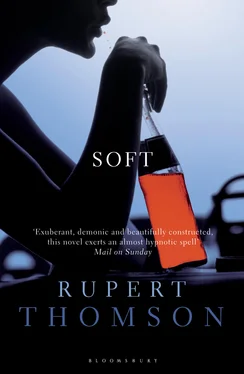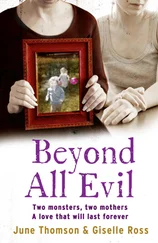Barker shrugged and lit a cigarette.
As a rule he didn’t go to parties — they were too much like being at work — and when he walked in through the front door that night and saw two girls in ra-ra skirts trying to tear each other’s hair out by the roots, he almost turned around and left.
But Ray wouldn’t let him. ‘Give it five minutes, all right?’
‘What,’ Barker said, ‘the fight?’
He found a beer and swallowed half of it, then climbed the stairs. On the first floor, outside the toilet, he ran into a DJ he knew. The DJ had some speed on him. Did Barker want a line? No, Barker didn’t.
‘Fries your brain,’ he said.
The DJ put his index fingers to his head and made a sound with b’s and z’s in it, then grinned and walked away.
Ten minutes later Barker looked through a half-open door and saw a woman dancing. It was dark in the room, one cheap lamp in the corner, forty-watt bulb, and some glow from the street, no curtains on the windows, there were never any curtains. He could still remember the song that was playing, an old Temptations number, vintage Temptations, before Eddie McKendrick left the group. The woman was dancing with a small man who swayed backwards and forwards like one of those bottom-heavy toys — it doesn’t matter how many times you push them over, or how hard, they always right themselves. Barker waited until she was facing him, then he called out to her.
‘Over here a moment.’
The music had changed by now, it was Smokey Robinson, and though she was still dancing, she was looking across at him, trying to understand what he was saying.
He waved at her. ‘Over here.’
She bent down, put her mouth beside the short man’s ear, then she stepped away from him and walked over, her eyes lowered. She had looked good from a distance. She looked even better close-up, black hair to her shoulders, a wide mouth, her body ungainly and voluptuous. He thought he had seen her before — though he wasn’t about to use a tired line like that. Yes, on Herbert Street. She had been climbing out of a car parked halfway up the hill. There was something about her awkwardness that had excited him. In the bright sunshine, her black dress had looked almost shabby, as if it had been washed too many times, and the whiteness of her legs showed through her thin black tights. He put his drink down, glanced over her shoulder.
‘That bloke you’re dancing with,’ he said.
‘What about him?’
‘He’s too short.’
She wasn’t sure what to think, whether to laugh or be insulted; her face remained perfectly balanced between the two possibilities, like a cat walking along the top of a fence.
‘He’s not your husband, is he?’
‘I’m not married.’
‘Are you going out with him?’
She shook her head. ‘He’s just a friend.’
He paused for a moment, but then he saw that she was waiting for him to say something else.
‘You shouldn’t be dancing with a short bloke like that,’ he said, ‘not someone as good-looking as you. It doesn’t look right …’ She was keeping a straight face, as if he was giving her advice, but they both knew it was just talk. ‘I work in clubs,’ he went on. ‘I see people dancing all the time. I know what looks right.’
One song finished, another began. She glanced at her friend, who was standing by the window with a drink, then, after a while, her eyes returned to Barker again, a smile below the surface, shining, like treasure seen through water.
‘You’re not short, though,’ she said, ‘are you?’
Three weeks later she moved in with him. She worked in the day, at the local building society, and he worked on Union Street, six nights a week, so they didn’t see as much of each other as they would have liked. She would come home at six in the evening, half an hour before he had to leave. The moment she walked in, he would start undressing her — the crisp white blouse with the name-badge pinned to it, the knee-length sky-blue skirt. They would have sex just inside the front door, on a bed of autumn leaflets and junk mail. That same year she got pregnant. She wanted an abortion, though. She was only twenty-two, and she’d just got the first decent job of her life. She didn’t want to give it up, not yet. And, after all, she said, they weren’t exactly pressed for time, were they? He told her that he would find it hard to forget about the child — a remark that now seemed ominous, prophetic — but she wouldn’t change her mind and in the end, because he loved her, he agreed.
He peered through the smeared window of the train. Fields flew past. Then a row of houses. Then more fields.
He should never have agreed. No, never. If there had been a child, she wouldn’t have been able to leave so easily. If there had been a child, he wouldn’t have been able to let her go.
‘I don’t feel very well.’
It was Glade who had spoken. Her skin looked chilled and damp, as though a fever had taken hold of her. Cans of Kwench! rolled stupidly across the table, a hollow tinny sound each time they collided. He counted six of them, all empty.
‘You drank the lot?’
She nodded miserably. ‘I think I’m going to be sick.’
He took her through the automatic door and into the gap between the two carriages. He had to support her, otherwise she would have fallen. He could feel her rib-cage under her T-shirt; the curve of her right breast touched the back of his wrist through the thin fabric. This wasn’t something he could think about. He pushed her into a vacant toilet and closed the door behind her.
Standing by the window, he could hear her vomiting. It sounded like water being emptied out of a bucket. He watched the landscape rushing by with nothing in his mind. At last the door opened and she appeared, her lips a pale mauve, her orange hair matted, sticking to her forehead.
‘Feel better?’
‘A bit.’
He looked past her, into the toilet. She hadn’t flushed it. The stainless-steel bowl was full of frothy orange liquid. It looked no different to the way it would have looked if she’d just poured it out of a can. He stepped past her, pressed the flush button with his foot. The liquid vanished with a vicious roar.
Back in her seat, she started muttering again.
‘Glade?’
Her eyes flicked sideways, but she didn’t stop. The swaying of the train, the rolling of the cans.
‘Glade!’ He reached through the debris and gripped her by the wrist. She stared at his hand with its big chipped nails and its misshapen knuckles, then her eyes shifted to his forearm, which was tattooed with swords and flags and coiled snakes. At last she stared levelly into his eyes.
‘Look out of the window,’ he said.
She did as she was told.
‘What can you see?’
‘I don’t know,’ she murmured, narrowing her eyes. ‘Everything’s kind of … kind of orange …’
‘There’s nothing orange out there.’ He tightened his grip on her wrist. ‘Are you listening to me? There’s no orange there at all.’
‘No?’
‘There’s fields. Green fields.’
‘Fields.’ Her bottom lip quivered.
‘Jesus Christ.’ Despairing, he pushed one hand savagely into his hair. What did he think he was doing? This linking of himself with her, it was, just a fantasy, wishful thinking, as bright and hollow as the cans that were still rolling this way and that across the table.
‘I’m trying,’ she said. ‘I really am.’
He leaned forwards, thought for a while.
‘Where the fields are,’ he said, ‘there used to be trees. Can you imagine that?’
She turned to the window, her eyes wide, the lashes dark and wet.
‘That’s how it was,’ he said, ‘all trees. Oak, ash, thorn —’
‘When was that?’
Читать дальше












